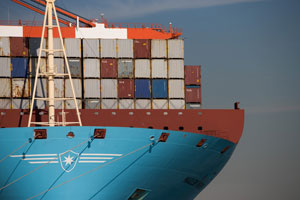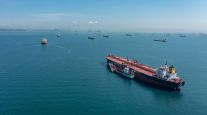Global Shipping Slumps on Fears of Trade Crisis

The world’s largest ship broker admitted its business has been battered by weak global trade – underlining the crisis engulfing the shipping industry.
In a grim trading update that raises questions about the outlook for the global economy, London-based Clarkson said it expects profits for this year to be ‘materially lower’ than they were last year.
The warning took investors by surprise and sent shares tumbling 16% – wiping more than $130 million off the value of the company.
The shipping industry has been rocked by subdued levels of world trade as major exporting nations such as the U.S., China and South Korea suffer weak demand for their goods.
The cost of shipping freight around the world has also tumbled, partly due to an earlier shipbuilding boom that increased the supply of vessels available to transport goods at a time of weak demand.
Clarkson said the offshore oil and gas industry ‘remains depressed’ due to the slump in the price of crude.
A lack of confidence in the outlook has also taken its toll on Clarkson’s finance business which helps shipping companies raise funds.
The crisis facing the shipping industry has fueled fears that the global economy is heading for the rocks.
Clarkson, which was founded in 1852 and has 1,379 staff members in 46 offices in 20 countries, made profits of $66 million last year.
“Shipping is a cyclical business, so the timing of recovery is uncertain but we believe it is prudent to assume that it is likely to be delayed into 2017,” said Panmure analyst Colin Smith.
Clarkson pointed out that the ClarkSea Index – which measures earnings for vessels – has fallen 10% in recent weeks and was 30% lower in the first half of 2016 than in the first half of 2015.
It also noted that the Baltic Dry Index – which measures the cost of shipping raw materials such as coal, iron ore and grain – has hit all-time lows this year.
This index, one of the key indicators experts look at to determine the outlook for the global economy, fell from 1,200 last summer to below 300 this spring although it has picked up since then to 677 July 4.




